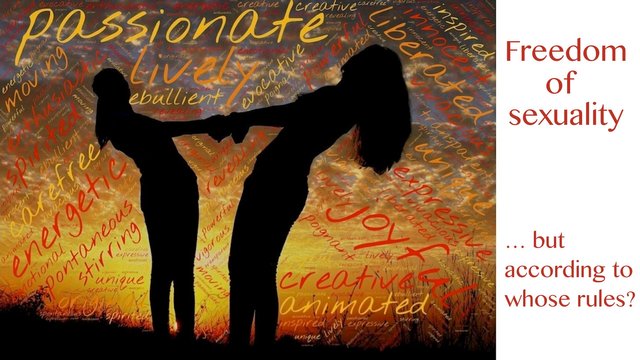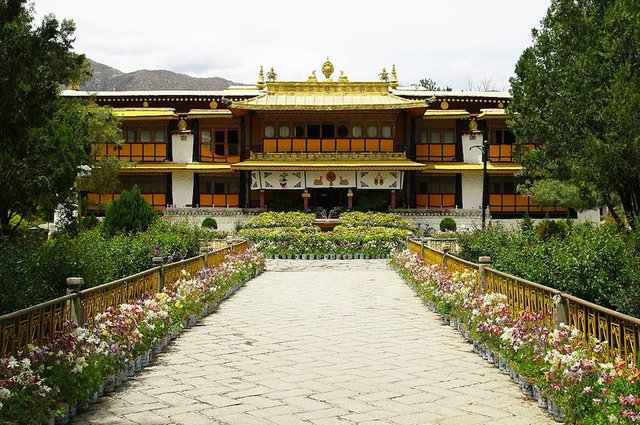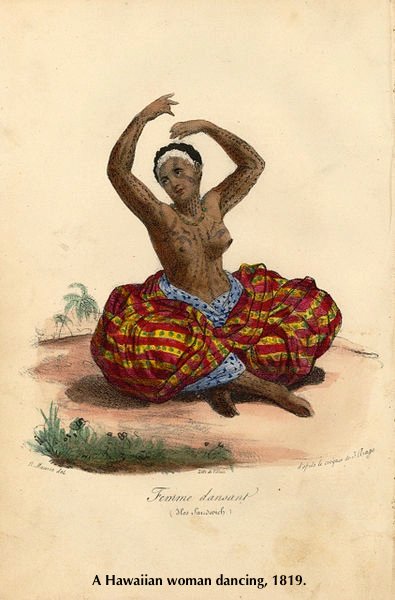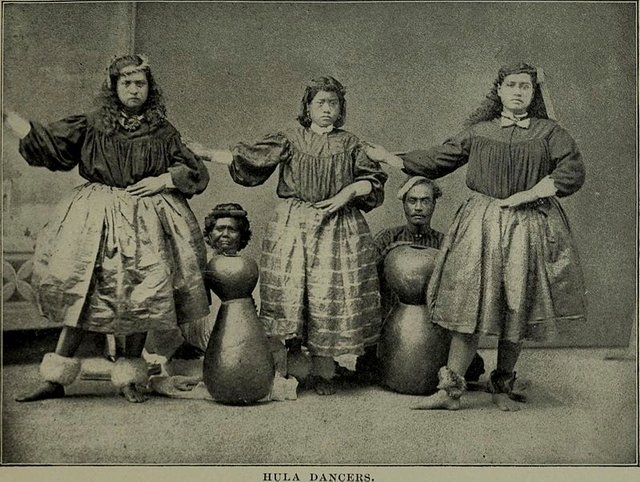Freedom of sexuality: liberation or just another moral code?

Freedom of sexuality is the theme for this week's #freedomfriday challenge, set by @eaglespirit, and the very phrase gets the mind racing. In the western world, "sexual freedom" is indelibly associated with the 1960s, a time when young people shook off the last remaining moral strictures of the Victorian age.

Source Young people dancing the "Twist" in 1964.
Photo by Christa Hochneder, Bundesarchiv
And yet despite the capital of the United Kingdom being labelled "Swinging London" in the 1960s, it was 1969 before homosexuality was decriminalised in the UK. In other words, people could be jailed for being gay. Homosexuality was so taboo, that many gay men in London used a secret language, Polari.
These days, "freedom of sexuality" is more likely to evoke thoughts of rights to sexual expression. This is a very interesting topic from a historical perspective, because in many countries around the world, sexual expression became restricted as a direct result of the influence of Christian missionaries in the 18th and 19th centuries.
I started to learn more about this as I travelled round the world from 1995 to '97.
Pleasure gardens
I visited Tibet in January 1996. There were very few tourists at this time of year. When I visited the Norbulingka, the former summer residence of the Dalai Lama, before he fled in 1959, I wandered around the grounds alone, admiring the gardens.

Source The Norbulingka Palace and gardens, Tibet.
There was no one else about – or so I thought, until I heard a strange rustling sound, which I thought was an animal or bird. The sound was coming from below an ornamental bridge. I peered over it and saw two Chinese men in uniform, rolling around in the bushes, locked in a passionate embrace.
It was so unexpected, and made me think about the reality that often exists behind the carefully constructed facades maintained by rigidly-controlled societies. Homosexuality was legalised in China in 1997, and was officially considered a mental illness until 2001. Yet further back in history, homosexuality in China appears to have been considered acceptable.
Sexuality in Polynesia
Later in 1996 I visited the Pacific Island nation of Tonga, and at a disco on one of the more remote islands, I danced with a young man wearing a mini skirt. He was a fakaleiti, a Tongan who was born male but was brought up to identify as a female. This is a traditional Polynesian gender role, known as fa'afafine in the Pacific Island group of Samoa and by other names in other Polynesian island groups.
The man I danced with identified as gay, but there is a lot of controversy around this terminology, and whether it can be equated with modern ideas of homosexuality and transgender roles. Early anthropologists concluded that the role was allocated by the family if there were too many boys and they needed help with the women's duties in the household, but this theory is now disputed. What is clear is that the people of Polynesia traditionally did not adhere rigidly to Western ideas of the "nuclear family".
The American anthropologist Margaret Mead is blamed for sensationalising the sexual attitudes of Polynesians, but certainly in some island groups there were more liberal attitudes, especially when compared with the constricted moral values of 19th century Christian missionaries.

When the Christian missionaries John Harris and William Crook visited the remote Marquesas islands in the 18th century, they received a warm and enthusiastic welcome – so enthusiastic that the Chief offered Harris his wife to "enjoy" for the evening (according to the records of Captain Wilson of the Duff*). Harris was not impressed, and refused to have anything to do with the woman, who was so surprised that she and her female friends "became doubtful of his sex".
That night, as Harris slept, they "satisfied themselves concerning that point", waking the man up. He fled on the spot, and was eventually rescued by his shipmates.
It would be wrong to stereotype Pacific Island societies as having a "free and easy" attitude to sexuality. This is where Margaret Mead went wrong. They did have strictures and moral codes, but these were quite different from those of the European societies of the 18th and 19th centuries. And they varied among different island groups.
Missionary imposition
Christian missionaries visited the Pacific Islands shortly after Captain Cook "discovered" them, and they were followed by European gunboats and colonisation. I became very interested in this period of history after travelling to the Pacific Islands, probably because my father came from another former British Empire colony, the Bahamas, an island group not in the Pacific, but in the Caribbean – however I found some interesting parallels, especially with the imposition of Christianity.
I did further study in Glasgow University and found the Native Dancing Regulations of 1936. I had heard that the missionaries had "banned dancing", but until you see it in print, it's quite hard to believe! The type of fluid and expressive dancing that the Pacific Islanders enjoyed was seen as leading to moral corruption.
How ironic that less than 20 years later a similar type of fluid and expressive dancing would herald a change of attitudes towards sexuality in western countries!

Source The flamboyance of traditional dancing in the Pacific Islands was tightly controlled and restricted by Christian missionaries.
And how ironic that the same countries that imposed sexual restrictions on the people all over the world that they colonised, are now urging the removal of those restrictions and demanding freedom of sexual expression.
I support freedom of sexual expression for gay and transgender people – in fact of all types of sexuality, as long as it's between consenting adults and doesn't cause harm to others.
But sometimes I think we should think more deeply about these issues before taking the moral high ground. Freedom should be about love and doing no harm, not about imposing your will on others.
Other sources
Main photo source
- London Missionary Society (1799). A missionary voyage to the southern Pacific ocean, performed in the years 1796, 1797, 1798, in the ship Duff, commanded by Captain James Wilson.
Posted from my blog with SteemPress : http://ramblingandscrambling.co.uk/thoughts/freedom-of-sexuality-liberation-or-just-another-moral-code/

.gif)

Congratulations! This post has been chosen as one of the daily Whistle Stops for The STEEM Engine!
You can see your post's place along the track here: The Daily Whistle Stops, Issue 287 (10/20/18)
very interesting post natubat and i am so happy by your participation. i begin to wonder why so many people are interested in writing about homosexuality when it comes to freedom of sex? maybe because so many have seen it "restricted" in some way or form ... but definitely appears to be a go-to topic.
Thanks so much @eaglespirit! Glad you enjoyed reading it. I think it's because homosexuality has been so repressed, yet it's always been there. One of my best friends is gay, and I know she had a lot of struggles with this, especially when she was a teenager. My godfather was gay. He died when I was about 10 years old, and at that time homosexuality had only recently been decriminalised in the UK. No one ever said that he was gay, but somehow it seemed obvious, even when we were children. Life must have been so difficult for him.
Absolutely. Loved this post as it was so interesting to read about Polynesia. I also didn't know that about the secret language in London.... in Australia, they didn't decriminalize it until MUCH later.
Great post!!!
Posted using Partiko Android
Thanks @riverflows! Glad you enjoyed my post. I didn't know that about Australia - astonishing.
Different cultures, traditions, and moral standards and it then defines how sexuality is shown or practiced among people. But for me it is just immoral for the same sex to have sexual relations in particular.
I don't agree, but I think everyone is entitled to their own viewpoint. I have good friends who are gay and they love each other very much. It makes them happy and we could do with more happiness in this world.
May I ask what makes you think its immoral @cryptopie? I find that interesting as morality is often through cultural lenses too.
Posted using Partiko Android